Login
Registration enables users to use special features of this website, such as past
order histories, retained contact details for faster checkout, review submissions, and special promotions.
order histories, retained contact details for faster checkout, review submissions, and special promotions.
Forgot password?
Registration enables users to use special features of this website, such as past
order histories, retained contact details for faster checkout, review submissions, and special promotions.
order histories, retained contact details for faster checkout, review submissions, and special promotions.
Quick Order
Products
Antibodies
ELISA and Assay Kits
Research Areas
Infectious Disease
Resources
Purchasing
Reference Material
Contact Us
Location
Corporate Headquarters
Vector Laboratories, Inc.
6737 Mowry Ave
Newark, CA 94560
United States
Telephone Numbers
Customer Service: (800) 227-6666 / (650) 697-3600
Contact Us
Additional Contact Details
Login
Registration enables users to use special features of this website, such as past
order histories, retained contact details for faster checkout, review submissions, and special promotions.
order histories, retained contact details for faster checkout, review submissions, and special promotions.
Forgot password?
Registration enables users to use special features of this website, such as past
order histories, retained contact details for faster checkout, review submissions, and special promotions.
order histories, retained contact details for faster checkout, review submissions, and special promotions.
Quick Order
PathPlusTM IDH1 / IDH Antibodies
IDH1 is a nuclear enzyme found in cells throughout the body with highest expression in male reproductive tissues, the adrenal gland, liver, breast, the gastrointestinal tract, endometrium and adipose tissue. It is functionally involved in DNA repair, metabolism and epigenetic regulation. IDH1 is frequently mutated in specific types of cancer; for example, the IDH1 mutation R132H is common in secondary glioblastomas, and antibodies specific to this mutation are used in the diagnosis of astrocytomas and oligodendroglial tumors where the mutation has a 70% rate of occurrence. R132H mutation IDH1 antibodies distinguish astrocytoma from primary glioblastomas, and differentiate diffuse astrocytoma grade II from ependymoma or pilocytic astrocytoma. They also stain positively in around 12% of acute myeloid leukemia. In addition, antibodies that recognize wild-type IDH1 may be used as a control alongside mutation-specific antibodies in the differential diagnosis of secondary glioblastomas (mutation positive) from primary glioblastomas (majority are mutation negative).
References: Oncogene. 2018. 37, 1949–1960, DOI: 10.1038/s41388-017-0077-z; Curr Neurol Neurosci Rep. 2013 May;13(5):345, PMID: 23532369; PLoS One. 2017 Jan 4;12(1):e0169038, PMID: 28052098; Cell Rep. 2018 Oct 23;25(4):1018-1026.e4, PMID: 30355481; Am J Clin Pathol. 2011 Jan;135(1):35-45, PMID: 21173122;
6 PathPlusTM Antibodies
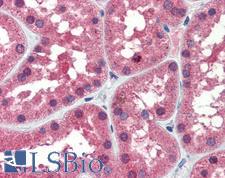
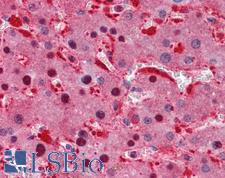
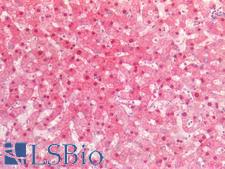
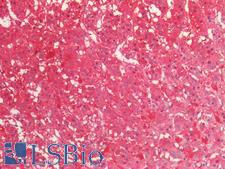
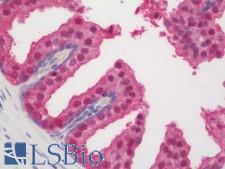
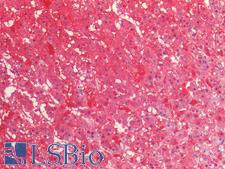
☰ Filters
Products
Antibodies
(6)
Type
Primary
(6)
Target
IDH1 / IDH
(6)
Reactivity
Human
(6)
Mouse
(3)
Rat
(2)
Pig
(2)
Application
IHC
(3)
IHC-P
(6)
WB
(6)
Flo
(1)
ELISA
(1)
ICC
(3)
IF
(2)
Host
rabbit
(3)
mouse
(3)
Product Group
PathPlus Cancer
(6)
PathPlus Cancer Pathology
(6)
Isotype
IgG
(1)
IgG2a,k
(3)
Clonality
monoclonal mc
(3)
polyclonal pc
(3)
Clone
AT25H10
(1)
C12
(1)
C13
(1)
Format
Unconjugated
(6)
Epitope
aa116-143
(1)
aa290-339
(1)
Publications
No
(6)

Cancer Pathology
Cancer
IDH1 / IDH Rabbit anti-Human Polyclonal (aa290-339) Antibody
Rat, Human
IHC, IHC-P, WB
Unconjugated
100 µl/$485

Cancer Pathology
Cancer
IDH1 / IDH Rabbit anti-Human Polyclonal Antibody
Human
IHC, IHC-P, WB
Unconjugated
50 µl/$460

Cancer Pathology
Cancer
IDH1 / IDH Mouse anti-Human Monoclonal (AT25H10) Antibody
Human
ELISA, ICC, IF, IHC-P, WB
Unconjugated
100 µl/$460

Cancer Pathology
Cancer
IDH1 / IDH Mouse anti-Human Monoclonal (C13) Antibody
Mouse, Pig, Human
ICC, IHC-P, WB
Unconjugated
50 µl/$460

Cancer Pathology
Cancer
IDH1 / IDH Rabbit anti-Human Polyclonal (aa116-143) Antibody
Mouse, Human
Flo, IF, IHC, IHC-P, WB
Unconjugated
100 µl/$460

Cancer Pathology
Cancer
IDH1 / IDH Mouse anti-Human Monoclonal (C12) Antibody
Mouse, Rat, Pig, Human
ICC, IHC-P, WB
Unconjugated
50 µl/$460
Viewing 1-6
of 6
product results










